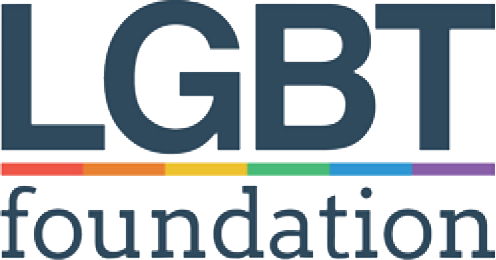Monday, 4th December 2017

I am LGBT Foundation’s Policy and Research Coordinator and I’m currently leading a Lankelly Chase-funded research project exploring what ‘severe and multiple disadvantage’ looks like in the lives of LGBT people (see the project briefing attached above for more detail). I’m emailing to ask for your support with a focus group we will be running in Leicester as part of the project.
We have already conducted a number of in-depth interviews with LGBT people who have experienced multiple life difficulties in Greater Manchester, and the next phase of the project is to conduct two National focus groups – one in Bristol (4th December) and one in Leicester (11th December). We are hoping to attract between 5 – 10 participants to the Leicester focus group, each of whom should identify as lesbian, gay, bisexual, or trans, and have experienced a combination of homelessness, substance use, offending, poor mental health, domestic abuse, sex work, or any other self-defined ‘disadvantages’.
Date: Monday 11th December Monday 18th December
Time: 6:00 - 7:30pm
Location: Leicester LGBT Centre, 15 Wellington Street, Leicester, LE1 6HH.
What is the project about?
In January 2015, Lankelly Chase released the Hard Edges report, highlighting what life is like for people facing ‘severe and multiple disadvantage’ (SMD), which is generally defined as experiencing a combination of homelessness, drug and alcohol abuse, offending, and mental health issues. However, whilst the findings provided valuable insight into what SMD looks like for the general population, the report did not monitor sexual orientation or trans status and therefore we do not know what proportion of the respondents identified as lesbian, gay, bisexual, or trans (LGBT). As a result, we are unsure how LGBT people may experience severe and multiple disadvantage in similar or different ways to the general population.
There are several studies suggesting that LGBT people may be over-represented in certain aspects of severe and multiple disadvantage, or may experience them differently. For example, previous research shows that as many as 1 in 3 homeless youth are LGBT (Crisis, 2005), that LGBT people are more likely to be substance dependent (University of Central Lancashire, 2014) and that LGBT people are more likely to face mental health challenges such as depression and anxiety (King et al 2008). What we don’t know, however, is how these factors interact to affect the lives of LGBT people, or if there are other factors not yet researched within current SMD literature (for example, domestic abuse or sex work) that may constitute severe disadvantage for LGBT people.
As a result of this gap in knowledge, we have been funded by Lankelly Chase to conduct research with LGBT people to understand what constitutes severe and multiple disadvantage for this group, exploring their experiences and the impact it has on their lives, and using this information to support the development of services which are truly responsive to LGBT people. This study breaks new ground in developing an understanding of the specific severe and multiple disadvantage needs of a population where there is already a strong evidence base around some inequalities, but where few studies have drawn this evidence together in order to paint a picture of complex needs.
How are we conducting the research?
LGBT people with lived experience of severe and multiple disadvantage play a central role in the research process for this project. As such, we have adopted a ‘peer led’ approach, ensuring that those with lived experience take the lead on the design, development, delivery, and dissemination of the research at every stage. To achieve this, we have set up a ‘Core Group’ of LGBT people who have experienced multiple life difficulties who play an essential role in shaping the project, meeting monthly to advise on all aspects of the research and also participating directly in data capture (through ‘peer interviewing’) and data analysis. We have ensured that the research process is mutually beneficial by paying Core Group members for their time and offering access to an NVQ in Health and Social Care and the option to engage with volunteering opportunities within LGBT Foundation in return for valuable insight and expertise.
Thus far, peer interviewers have conducted 17 in-depth interviews with LGBT people with lived experience of severe and multiple disadvantage. We have also conducted a national survey of LGBT voluntary, community, and social enterprise organisations to assess their impressions of what constitutes SMD for LGBT people based on their experience of providing services to the community, and have recently launched a second survey (which can be found at: https://www.surveymonkey.co.uk/r/lgbtexperiences) to assess SMD ‘sector’ organisations’ awareness and inclusion of LGBT needs. This data will be supplemented by two national focus groups (in Bristol and Leicester) exploring LGBT people’s experiences of SMD within different geographical and socio-economic contexts.
What have we found so far?
Initial analysis indicates that for LGBT people, discrimination in the form of homo/bi/transphobia begins at an early age and continues throughout the life course, acting as a sort of ‘foundation’ upon which other disadvantages arise, intertwine, and worsen until they effectively constitute ‘severe and multiple disadvantage’.
Not only are LGBT people experiencing multiple life difficulties that align with ‘traditional’ definitions of severe and multiple disadvantage; in Greater Manchester, they are also experiencing other disadvantages, such as domestic abuse, engaging in sex work, and being in the process of seeking asylum or refuge, which combine to marginalise and exclude them.
Furthermore, where LGBT people are attempting to access services designed to support them, our research indicates that their experiences are largely negative. Interviewees report experiencing overt discrimination on the grounds of their sexual orientation, gender identity, or trans status (“When they realised I was trans [the shelter] turned me away. It was a church and they didn’t want ‘my kind’ there”), missed opportunities for support as a result of a reluctance from frontline staff to ask about sexual orientation/trans status (“there was an awful lot of points where they could have reach me”), and a general disregard for how sexual orientation/trans status might impact on their experiences of disadvantage (“No support, absolutely no support”).
Where LGBT people have found support, this has often been linked to strengths and assets within the LGBT community itself rather than from mainstream support services. For example, several interviewees talked about the important role that LGBT peers and LGBT specific support services have had in their journey to recovery and/or greater support.
Preliminary recommendations:
- If we’re not counted, we don’t count! – sexual orientation / trans status monitoring in all services
- Make it visible – LGBT affirmative services
- Understand the whole person – sexual orientation / trans status impacts on people’s experiences of SMD
- Nothing about me without me - Involve people with lived experience
What will the findings be used for?
Our project is a piece of action research that seeks to deliver real change for LGBT people experiencing severe and multiple disadvantage. It therefore includes an accompanying policy-focused dimension, enabling practical application of the evidence generated to positively influence the severe and multiple disadvantage agenda and service provision for the most marginalised LGBT people.
LGBT Foundation and members of the project’s Steering Group are closely linked with commissioners and policy makers in Greater Manchester, and the devolution agenda presents a timely opportunity: historically, the majority of commissioning decisions have been take centrally, but devolution offers an opportunity to influence local commissioners to provide services that suit local need. We are in the process of creating a worked case study which could be utilised by other devolved authorities to ensure both that LGBT communities’ needs are better met, and that the VCSE sector is involved as an equal partner in devolution plans.
We are also in the process of developing a series of ‘action workshops’ with partner organisations designed to facilitate conversation between people with lived experience and decision-makers about how we can take the research findings forwards in ways which will tangibly improve the lives of LGBT people experiencing SMD.
Internally, we have already begun to embed service user involvement into our working, building on the research process and findings to involve service users meaningfully in the design and delivery of our own services.
How can you get involved?
There are lots of ways that you can support the project:
- Referring people to us – do you work with people who are experiencing severe and multiple disadvantage? Please tell them about our study and let them know how they can get involved and have their voices heard.
- Professional networks - do you know of any organisations that might be able to help us recruit participants for the core group or the interviews? Can you tell colleagues and partner organisations about our research?
- Reviewing your working practices – could this research change the way that you do things moving forwards to better meet LGBT needs? Would you like to receive training around LGBT awareness and experiences of SMD? Do you have any good practice to share? Please get in touch!
- Feedback- do you have experience or knowledge of other areas you think we should consider as part of the research? We would welcome any suggestions!
If you would like to know more, please contact sophie.melville@lgbt.foundation

